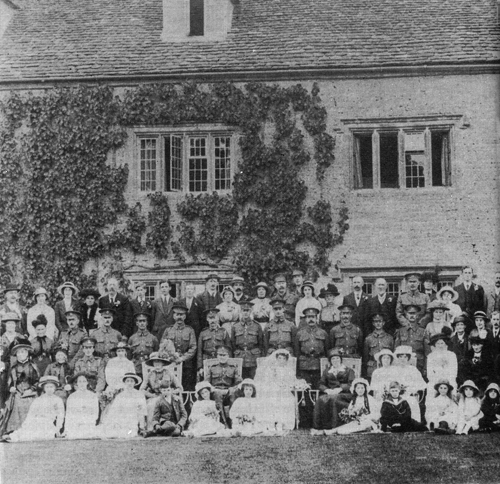This article was written in 1988 by John Rawlins and appeared in No. 4 of the Society’s Journal. It is reproduced here as part of our occasional series on Prebendal House.
The activities of the Oxford Archaeological Unit at Prebendal House, coupled with the interest and co-operation of the owners and their contractors, stimulated the Society to research further into its history. A request was made for any old photographs which might add to our knowledge of the property. Initially very few were forthcoming, but on checking an old photograph of the Prebendal staff with Bob Bradley, he produced the wedding photograph shown here. Both his mother and my father appear in the back row, and Mrs Hinde, the owner of Prebendal at the time, sits on the groom’s right. It was obviously taken at Prebendal, but why and when?

The photograph prompted Norman Frost to recall some correspondence he had had with a retired minister of the United Reform Church, the Revd Norman Singleton. With the kind permission of the Revd Singleton (who appears as the pageboy in the sailor-suit in the front row) the letter is now quoted in full.
When war with Germany was declared in August, 1914, the Old Prebendal at Shipton under Wychwood was a lovely ‘stately home’ in the old tradition – dignified, handsome, comfortable, well-staffed with ‘domestics’, gardeners and coachman, and owned by a ‘stately’ pair of occupiers, Dr and Mrs Hinde. Soon, Britain was really at war and our young men were being killed or wounded by tens of thousands, at which Dr and Mrs Hinde offered to turn part of the house into a convalescent home for wounded men, an offer quickly accepted by the authorities.
Beds, medical supplies, and other necessities, plus a nurse or two, quickly appeared at Shipton and were soon followed by a string of young men in blue hospital uniforms. When 1915 became warm enough, the lovely garden took on a new look with groups of blue-clad men – some bandaged, some on crutches ¬enjoying the peace and beauty of it.
At least two romances developed from all this. One had begun previously when Mrs Hinde engaged a new, young assistant gardener named William Sabin. Finding that Will was attracted to her personal maid, Nell Evens, Mrs Hinde thought it best for Nell to go home to Lancashire, which she did, though not surprisingly Will was soon called up for army service. Mrs Hinde was then without either of them and, missing Nell’s invaluable services, she quickly recalled Nell and used her in the convalescent home arrangements. To that end Mrs Hinde bought a motorcar – an Overland ‘tourer’ – which Nell quickly learned to drive and many of the wounded soldiers were met at the station by Nell and the Overland. And what could Mrs Hinde say or do when one of the wounded arrivals was none other than Will Sabin? Thus, a few years later Will and Nell were married, being tremendously happy together for many years and dying within a week of one another in Hertfordshire.
By another coincidence, one of the wounded soldiers turned out to be Nell’s brother, an extremely good-looking young man who, while at the Old Prebendary, quickly ‘fell’ for one of the young housemaids. It was all very sudden, and a great event in the first year of the Shipton ‘soldiers convalescent Home’ was when Levi Norman Evens (aged 22) married Katherine Lilian Alice Wall (21) at the Parish Church on 14 July 1915.
They were anxious to marry before Levi’s return to the trenches; Mrs Hinde was anxious that it should be more than just a ‘war wedding’; and so she did all she could to make it a great day for both. Thus, the procession out of the Church was of a ‘white’ bride, a handsome soldier bridegroom, soldier best man, six `white’ bridesmaids, and lastly a very young pageboy dressed in a sailor outfit and carrying a Union Jack which, incidentally, he had dropped with a clatter in the centre aisle during a prayer! (No carpet those days!) Sadly, as the war took its course, Levi Evens was badly gassed and he died very soon after the war ended.

